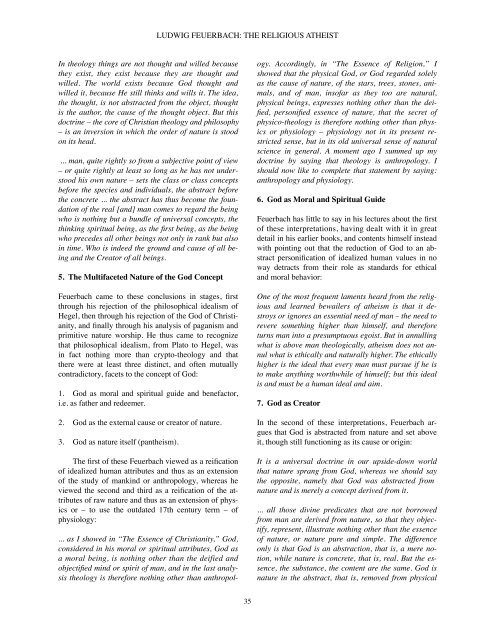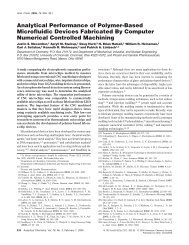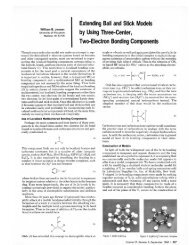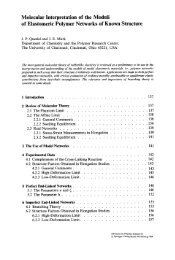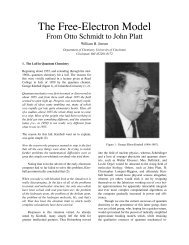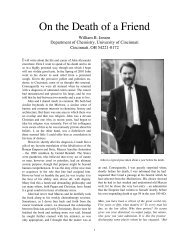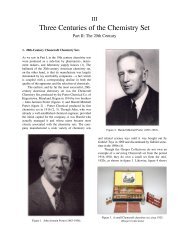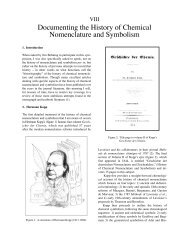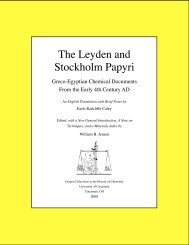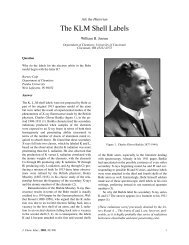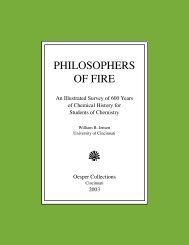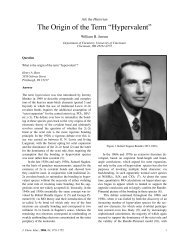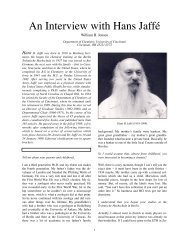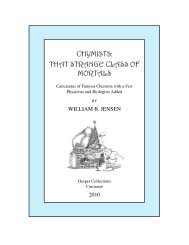Frankenstein's Cat.pdf - University of Cincinnati
Frankenstein's Cat.pdf - University of Cincinnati
Frankenstein's Cat.pdf - University of Cincinnati
You also want an ePaper? Increase the reach of your titles
YUMPU automatically turns print PDFs into web optimized ePapers that Google loves.
LUDWIG FEUERBACH: THE RELIGIOUS ATHEIST<br />
In theology things are not thought and willed because<br />
they exist, they exist because they are thought and<br />
willed. The world exists because God thought and<br />
willed it, because He still thinks and wills it. The idea,<br />
the thought, is not abstracted from the object, thought<br />
is the author, the cause <strong>of</strong> the thought object. But this<br />
doctrine – the core <strong>of</strong> Christian theology and philosophy<br />
– is an inversion in which the order <strong>of</strong> nature is stood<br />
on its head.<br />
... man, quite rightly so from a subjective point <strong>of</strong> view<br />
– or quite rightly at least so long as he has not understood<br />
his own nature – sets the class or class concepts<br />
before the species and individuals, the abstract before<br />
the concrete ... the abstract has thus become the foundation<br />
<strong>of</strong> the real [and] man comes to regard the being<br />
who is nothing but a bundle <strong>of</strong> universal concepts, the<br />
thinking spiritual being, as the first being, as the being<br />
who precedes all other beings not only in rank but also<br />
in time. Who is indeed the ground and cause <strong>of</strong> all being<br />
and the Creator <strong>of</strong> all beings.<br />
5. The Multifaceted Nature <strong>of</strong> the God Concept<br />
Feuerbach came to these conclusions in stages, first<br />
through his rejection <strong>of</strong> the philosophical idealism <strong>of</strong><br />
Hegel, then through his rejection <strong>of</strong> the God <strong>of</strong> Christianity,<br />
and finally through his analysis <strong>of</strong> paganism and<br />
primitive nature worship. He thus came to recognize<br />
that philosophical idealism, from Plato to Hegel, was<br />
in fact nothing more than crypto-theology and that<br />
there were at least three distinct, and <strong>of</strong>ten mutually<br />
contradictory, facets to the concept <strong>of</strong> God:<br />
1.! God as moral and spiritual guide and benefactor,<br />
i.e. as father and redeemer.<br />
2. ! God as the external cause or creator <strong>of</strong> nature.<br />
3. ! God as nature itself (pantheism).<br />
! The first <strong>of</strong> these Feuerbach viewed as a reification<br />
<strong>of</strong> idealized human attributes and thus as an extension<br />
<strong>of</strong> the study <strong>of</strong> mankind or anthropology, whereas he<br />
viewed the second and third as a reification <strong>of</strong> the attributes<br />
<strong>of</strong> raw nature and thus as an extension <strong>of</strong> physics<br />
or – to use the outdated 17th century term – <strong>of</strong><br />
physiology:<br />
... as I showed in “The Essence <strong>of</strong> Christianity,” God,<br />
considered in his moral or spiritual attributes, God as<br />
a moral being, is nothing other than the deified and<br />
objectified mind or spirit <strong>of</strong> man, and in the last analysis<br />
theology is therefore nothing other than anthropology.<br />
Accordingly, in “The Essence <strong>of</strong> Religion,” I<br />
showed that the physical God, or God regarded solely<br />
as the cause <strong>of</strong> nature, <strong>of</strong> the stars, trees, stones, animals,<br />
and <strong>of</strong> man, ins<strong>of</strong>ar as they too are natural,<br />
physical beings, expresses nothing other than the deified,<br />
personified essence <strong>of</strong> nature, that the secret <strong>of</strong><br />
physico-theology is therefore nothing other than physics<br />
or physiology – physiology not in its present restricted<br />
sense, but in its old universal sense <strong>of</strong> natural<br />
science in general. A moment ago I summed up my<br />
doctrine by saying that theology is anthropology. I<br />
should now like to complete that statement by saying:<br />
anthropology and physiology.<br />
6. God as Moral and Spiritual Guide<br />
Feuerbach has little to say in his lectures about the first<br />
<strong>of</strong> these interpretations, having dealt with it in great<br />
detail in his earlier books, and contents himself instead<br />
with pointing out that the reduction <strong>of</strong> God to an abstract<br />
personification <strong>of</strong> idealized human values in no<br />
way detracts from their role as standards for ethical<br />
and moral behavior:<br />
One <strong>of</strong> the most frequent laments heard from the religious<br />
and learned bewailers <strong>of</strong> atheism is that it destroys<br />
or ignores an essential need <strong>of</strong> man – the need to<br />
revere something higher than himself, and therefore<br />
turns man into a presumptuous egoist. But in annulling<br />
what is above man theologically, atheism does not annul<br />
what is ethically and naturally higher. The ethically<br />
higher is the ideal that every man must pursue if he is<br />
to make anything worthwhile <strong>of</strong> himself; but this ideal<br />
is and must be a human ideal and aim.<br />
7. God as Creator<br />
In the second <strong>of</strong> these interpretations, Feuerbach argues<br />
that God is abstracted from nature and set above<br />
it, though still functioning as its cause or origin:<br />
It is a universal doctrine in our upside-down world<br />
that nature sprang from God, whereas we should say<br />
the opposite, namely that God was abstracted from<br />
nature and is merely a concept derived from it.<br />
... all those divine predicates that are not borrowed<br />
from man are derived from nature, so that they objectify,<br />
represent, illustrate nothing other than the essence<br />
<strong>of</strong> nature, or nature pure and simple. The difference<br />
only is that God is an abstraction, that is, a mere notion,<br />
while nature is concrete, that is, real. But the essence,<br />
the substance, the content are the same. God is<br />
nature in the abstract, that is, removed from physical<br />
35


